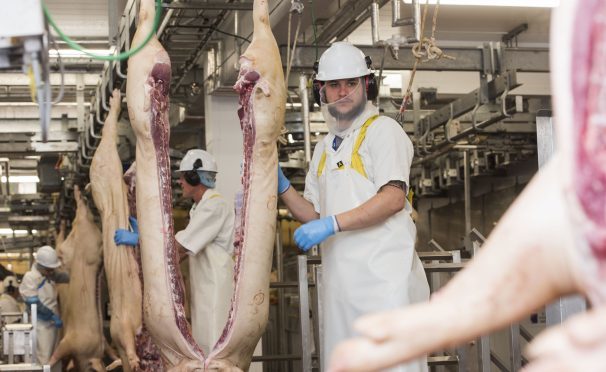Brechin’s £10 million pig abattoir will reopen on Monday with round-the-clock security guards.
Production was halted in early August when fire ripped through the newly-furbished abattoir, and police enquiries are still continuing into the cause of the blaze. Foul play has not been ruled out and that has led to a rethink of security at all abattoirs across Scotland.
The Brechin plant is run by Quality Pork Limited (QPL), a company formed by a collaboration between pig farmers and the major processor Tulip Ltd. Scottish Pig Producers chief executive Andy McGowan said there had been a major investment in new systems and security since August and a board meeting in two weeks’ time will decide if the 24-hour presence should be continued.
While most of the fire impact was to outbuildings, including a staff canteen, offices and storage shed, smoke and heat penetrated the roof space of the main building and caused significant damage to technical kit which has had to be replaced.
Mr McGowan said the company had been dependant on the Tulip plant at Ashton under Lyme near Manchester and Cookstown in Northern Ireland to take the Scottish pigs that were originally destined for Brechin.
“The closure trebled our transport distances and put pressure on sister plants in England who aren’t sitting with much spare capacity or haulage, so it’ll make a huge difference to get to normal,” he said.
“The countdown to the festive season has started and while there’s no longer the same spike in demand and a lot of the processed Christmas product is already prepared, there will be a few short weeks when workers take holidays.”
The company has been working towards the reopening date for the last five weeks and will restart production with a half week, eventually resuming to a throughput of 6000 pigs a week.
Pig prices have slipped back since the highs of the summer, when the deadweight price hit 166ppk. It now stands at around 158ppl, still a considerable improvement on the early-2016 low of 112ppk.
“The price has come back a bit quicker than we were expecting, largely due to a reduction in Chinese imports from Europe,” said Mr McGowan.
“It has meant there is some extra German product looking for a new home which is putting pressure on the market.”
However he added that a few farmers were currently working on business cases as a precursor to entering the industry
He said: “We’re not looking at dozens, but there are enough. Production is steady and while one or two farmers have given up for succession reasons, others have increased their output.”
nnicolson@thecourier.co.uk
